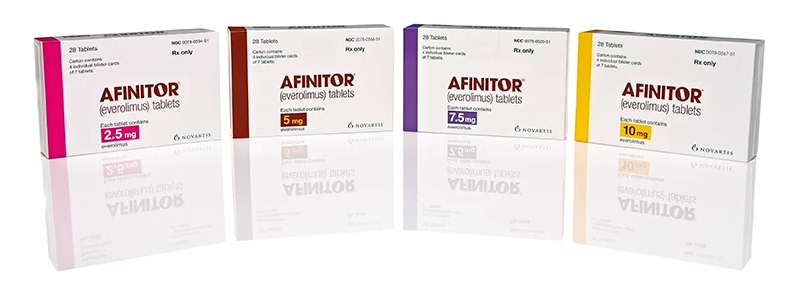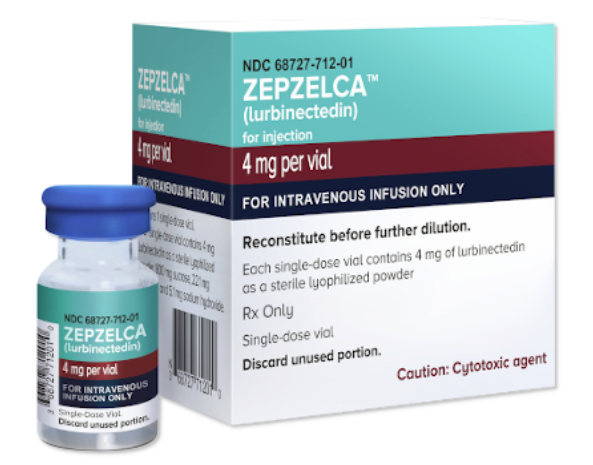Afinitor (everolimus) vs Zepzelca (lurbinectedin)
Afinitor (everolimus) vs Zepzelca (lurbinectedin)
Afinitor (everolimus) is an mTOR inhibitor primarily used in the treatment of certain types of cancers such as advanced renal cell carcinoma, breast cancer, and neuroendocrine tumors, as well as for preventing organ rejection in transplant patients. Zepzelca (lurbinectedin) is a newer anticancer medication that works as an alkylating agent, specifically indicated for the treatment of metastatic small cell lung cancer after prior platinum-based chemotherapy. When deciding between Afinitor and Zepzelca, it is crucial to consider the specific type of cancer being treated, as their indications and mechanisms of action differ significantly, and a healthcare provider's recommendation will be based on individual patient factors, including the type and stage of cancer, previous treatments, and overall health status.
Difference between Afinitor and Zepzelca
| Metric | Afinitor (everolimus) | Zepzelca (lurbinectedin) |
|---|---|---|
| Generic name | Everolimus | Lurbinectedin |
| Indications | Advanced hormone receptor-positive, HER2-negative breast cancer, advanced neuroendocrine tumors, renal cell carcinoma, tuberous sclerosis complex-associated seizures, subependymal giant cell astrocytoma, and renal angiomyolipoma. | Metastatic Small Cell Lung Cancer (SCLC) after disease progression on or after platinum-based chemotherapy. |
| Mechanism of action | mTOR inhibitor, which inhibits the mammalian target of rapamycin, a serine-threonine kinase. | Trabectedin analog that binds to the minor groove of DNA, disrupting the cell cycle and leading to cell death. |
| Brand names | Afinitor, Afinitor Disperz, Votubia | Zepzelca |
| Administrative route | Oral | Intravenous |
| Side effects | Mouth ulcers, infections, rash, fatigue, diarrhea, edema, abdominal pain, nausea, fever, pneumonitis, and hyperglycemia. | Fatigue, leukopenia, lymphopenia, anemia, increased creatinine, increased alanine aminotransferase, increased glucose, thrombocytopenia, nausea, dyspnea, decreased appetite, musculoskeletal pain, and constipation. |
| Contraindications | Hypersensitivity to everolimus or other rapamycin derivatives. | Hypersensitivity to lurbinectedin or any of the excipients. |
| Drug class | mTOR inhibitor | Alkylating drug |
| Manufacturer | Novartis | Pharma Mar, S.A. |
Efficacy
Afinitor (Everolimus) Efficacy in Lung Cancer
Afinitor (everolimus) is a medication that is primarily used to treat various types of cancer by inhibiting the mammalian target of rapamycin (mTOR), a protein that regulates cell growth, proliferation, and survival. While Afinitor is not primarily indicated for the treatment of lung cancer, it has been studied for its potential efficacy in certain types of non-small cell lung cancer (NSCLC), especially in cases where other treatments have failed. Clinical trials have shown that everolimus can provide a modest benefit in terms of progression-free survival in patients with advanced NSCLC, particularly in those with specific genetic alterations or after the failure of previous therapies.
However, the use of Afinitor in lung cancer is considered off-label, and the results regarding its efficacy are mixed. The benefits must be weighed against the potential side effects, and its use should be considered in a personalized context, taking into account the patient's overall health, cancer subtype, and previous treatments. It is important to note that everolimus is not a standard treatment for lung cancer and should only be used under the guidance of a specialist familiar with its use in this context.
Zepzelca (Lurbinectedin) Efficacy in Lung Cancer
Zepzelca (lurbinectedin) is a newer anticancer medication specifically approved for the treatment of adults with metastatic small cell lung cancer (SCLC) that has progressed after platinum-based chemotherapy. Lurbinectedin works by binding to the DNA of cancer cells, disrupting their ability to multiply and leading to cell death. Clinical trials have demonstrated that Zepzelca can lead to a significant reduction in tumor size and has an overall response rate that is considered promising for patients with relapsed SCLC.
The efficacy of Zepzelca in the treatment of SCLC has been supported by the results of a multicenter, single-arm, open-label phase II study, which showed a meaningful response rate and duration of response in patients with SCLC who have progressed on or after platinum-based chemotherapy. While the results are encouraging, the treatment is associated with a range of side effects, and its long-term efficacy and survival benefits continue to be studied. As with any cancer treatment, the use of Zepzelca should be individualized to the patient's condition and managed by a healthcare professional experienced in treating lung cancer.
Regulatory Agency Approvals
Afinitor
-
European Medical Agency (EMA), European Union

-
Food and Drug Administration (FDA), USA

-
Health Canada

-
Pharmaceuticals and Medical Devices Agency (PMDA), Japan

-
Therapeutic Goods Administration (TGA), Australia

Zepzelca
-
Food and Drug Administration (FDA), USA

Access Afinitor or Zepzelca today
If Afinitor or Zepzelca are not approved or available in your country (e.g. due to supply issues), you can access them via Everyone.org.
How it works

Make an enquiry
Choose the medicine you want to buy, answer a couple of questions, and upload your prescription to speed things up. We’ll get back to you within 24 hours.


Make an enquiry
Choose the medicine you want to buy, answer a couple of questions, and upload your prescription to speed things up. We’ll get back to you within 24 hours.


Breeze through the paperwork
We'll guide you through the required documents for importing unapproved medicine, ensuring you have all the necessary information.


Get a personalized quote
We’ll prepare a quote for you, including medicine costs and any shipping, administrative, or import fees that may apply.


Receive your medicine
Accept the quote and we’ll handle the rest - sourcing and safely delivering your medicine.

Some text on this page has been automatically generated. Speak to your physician before you start a new treatment or medication.
Let's talk
If you have any questions, call us or send us a message through WhatsApp or email:
Contact us




